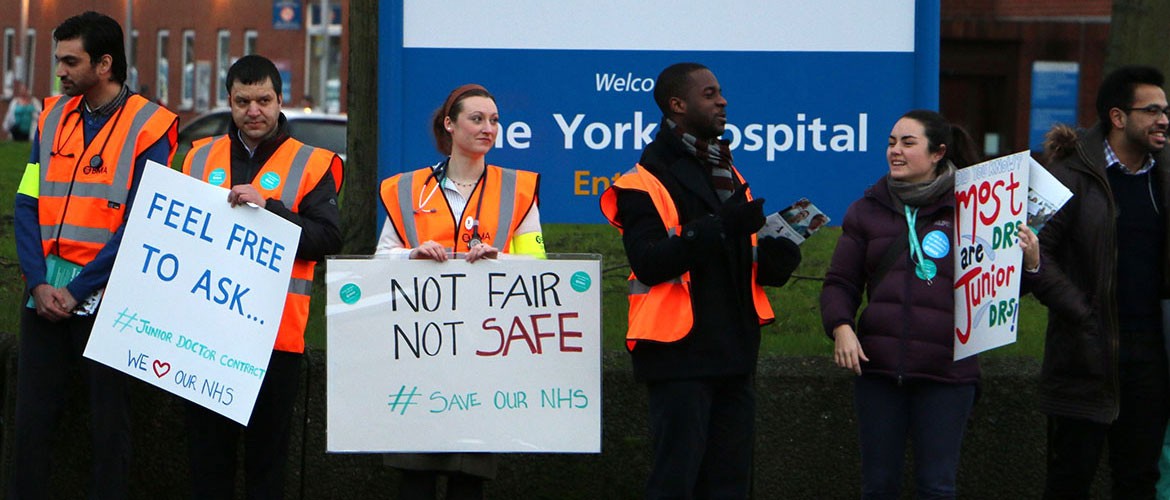 As the latest junior doctors strike enters its second day York junior doctor Veera Mirdavoudi argues that it is another act of public service by health workers
As the latest junior doctors strike enters its second day York junior doctor Veera Mirdavoudi argues that it is another act of public service by health workersAnother Sunday morning and the harsh screech of my alarm reminds me that it’s time to drag myself out of bed.
At this time of the year I’m up before the sun is, and as I look into the sunken eyes staring back at me from the mirror I have to remind myself that illness doesn’t sleep in on the weekend either.
This is why we run a 24-hour NHS, seven days a week.
[adrotate group=”4″]
The last few months have been a particularly tumultuous and well publicised snapshot of a drawn out struggle between the British Medical Association (the union which represents the interests of all British doctors) and the current government.
This struggle has revolved mainly around working hours and fair pay, with the government looking to stretch the already thin staff cover over additional days without paying them for the additional work.
Ministers want to do this by reducing income from the part of our salary that pays for out of hours. So even if though we would be working more, we would not be earning more.
York picket #JuniorDoctorsStrike #WeStandTogether @yorkpress @BBCYork @yhdoctors @minsterfm @yorkshirepost pic.twitter.com/38k9g35VYL
— Melody Redman (@MelodyRedman) April 6, 2016
There’s another area of concern too. And that is the active effort to weaken existing safeguards which protect doctors from being worked into exhaustion. Those safeguards penalise hospitals that build irresponsible rotas.
In an attempt to cover up the obvious problems with their proposed changes, the government has plucked numbers out of thin air, glued them together with confusing sentences and presented them proudly to the world like a six-year-old’s art project.
But we aren’t stupid, and neither is the public. In my experience very few people who even superficially understand what the proposed contract is about really believe that it is not worthy of opposition.
The true wedge which divides a minority of the public and doctors is the act of withdrawal of labour.
The ‘good’ and ‘bad’ doctor
Deciding whether or not to strike is one of the greatest internal struggles that doctors can face. Every doctor has a hazy memory of a younger, naïve version of themselves raising their hand and reciting the Hippocratic Oath, with a voice in their head telling them that they’re ready to go out into the world save lives.
Would that person have left his patients behind in hospital?
What I would tell that person today is that our duty to our patients isn’t restricted to each consultation, or even the beginning and end of a shift.
Going to work would make me a “good” doctor between 8am and 5pm on the strike day, but a “bad” one for every single day from August 2016 if the contract were to be imposed. Is it not worse to condemn all of my future patients to a crippled system for the unforeseeable future?
Nobody pretends that our choice is a good one, we admit that is merely the lesser of two evils. By withdrawing our labour for a few short days at a time, we are fighting the realisation of a morbid fantasy which will likely spell the end of an equitable healthcare system in England.
Striking is a public service
Am I being dramatic? Why does this threaten the existence of our system?
Although this issue is not fundamentally about pay, in reality salary is a deciding factor when a jobseeker is deciding who to work for. All other factors being equal, who wouldn’t choose an employment opportunity with a better salary?
Many British doctors are aware that they can continue to help people but do it somewhere where they can send their children to better schools and afford a better lifestyle. What does this mean for the size of our work force over time, and what will the resulting consequences be on the population it serves?
We are facing major recruitment crises across the country, and less doctors equates to more waiting. As you can imagine, more waiting in illness often means poorer outcomes.
For the meantime at least, doctors in England are still public servants. And despite the misconceptions regarding our intentions, our resistance to the proposed contract is a part of our service to you.
We have chosen to strike because to not do so show unforgivable complacency when dealing with such a hardline and authoritarian government. I, for one, will not just be a bystander in the systematic dismantling of the world’s greatest health service. Will you?
